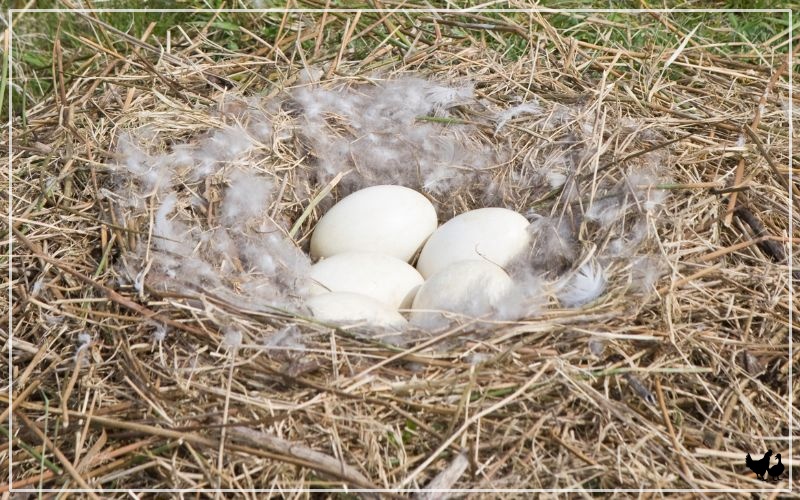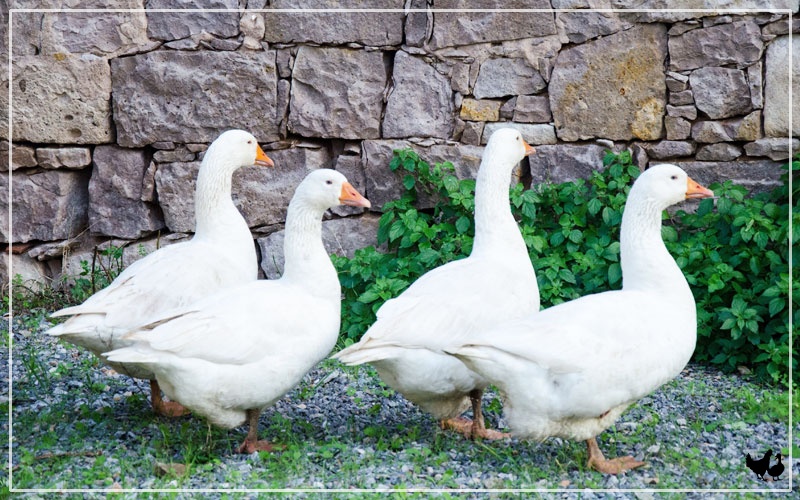When Do Geese Lay Eggs?
In the world of poultry, it is common to keep chicken for meat and eggs. The birds are considered low maintenance and great options for the highest returns on investment. Recently, geese are quickly gaining traction in poultry keeping as viable sources of highly nutritious eggs and meat. They are thus ideal options for anyone who wants to step away from traditional chicken keeping.

Most modern domestic geese breeds were developed from Swan and Greyland breeds. The domesticated breeds have enhanced traits like better foraging capabilities, quietness, friendliness and egg sitting than wild breeds.
In the wild, geese are quite secretive in egg-laying and mating. The secrecy is meant to protect their eggs from predators who will be unable to predict when there is a new egg in the nest. This leaves most people who choose to keep geese wondering how to handle egg-laying specifics.
The main question for poultry keepers is, ‘when do geese lay eggs?’ Here is a guide to answer this and other questions on egg-laying for geese.
At What Age do Geese Start Laying Eggs?
Before laying eggs, geese should be sexually mature. The sexual maturity age depends on the species of your goose. Some species will start laying eggs as early as when they turn nine months old, while in others, egg-laying is delayed to about four years old. In general, smaller species will mature earlier sexually than larger breeds.
On average, geese will start laying eggs at two years old. If your bird starts laying eggs when it is too young, this often affects its egg-laying ability in the subsequent years. This is crucial because most goose breeds only have 4-5 fertile periods in their lives.
The time of a goose’s birth determines its age when the breeding season sets in. A goose hatched early in the year reaches maturity in early spring or late winter, which is the usual mating season for geese. One that is born later misses her first mating season and has to wait until the next year to lay eggs.
Do Geese Lay Eggs Every Day?
No, geese do not lay eggs daily. During the egg-laying season, your bird will lay one egg every 48-72 hours despite its fertility or age. The birds will often lay eggs in the morning. The main trigger for when the eggs will be laid is hormones. The time of laying an egg depends on when the last one was laid. This is why geese do not have set laying routines.
Geese will lay 2-10 eggs per clutch, with wild geese only laying one clutch yearly. If you want the highest egg production, settle for Chinese or swan geese. Thanks to selective breeding, these lay eggs more frequently than other breeds. For instance, Chinese geese can lay up to 50 eggs per year.
Do Geese Lay Eggs in Spring?
Yes, geese lay eggs in the spring after their mating season. This is normally from mid-February to the end of May. Geese will start laying eggs about a month after the mating season begins. They will not need as much sunshine as other waterfowl like ducks to lay eggs. In fact, geese can lay eggs with as little as ten hours of sunlight.
The advantage of laying eggs early in the year is that the young ones have better chances of survival. In the wild, geese migrate during the winter. Being a few months old during migration makes the birds less vulnerable in harsh weather. The goslings also get enough time to learn how to fly before their migration in September or October.

Do Geese Need a Nest Box to Lay Eggs?
Yes, your goose will need a nest box to lay eggs. In the wild, geese use the same nesting sites yearly. The nests are often on elevated areas to protect the eggs from predators. When domesticated, you should make a nest box for your geese. If you do not, your birds will find a nesting spot that works for them but might not be safe for them or convenient for you.
Your nest box should be large enough for a goose to get in, sit comfortably and turn around. Nonetheless, do not make it so large that two geese sit in one nesting box because this might cause them to break eggs and reduce the eggs that hatch because they might get cold. The ideal goose nest is 18’’x18’’. It should be placed on the ground because geese are not very good climbers.
You can look out for signs that a goose is about to lay eggs so that you start preparing its nesting box. The bird will begin collecting materials like moss, feathers, grasses and dead plants to line its nest. It will also start scoping secret places where it can safely build its nest. In most instances, the spot is close to water. You might also notice a goose missing a few feathers that she might pluck out to line the nest.
Can Geese Lay Eggs Without a Gander?
Yes, geese can lay eggs without a gander. Though these eggs are normal, they will stay unfertilized. This means that your eggs will not develop into goslings and remain only as egg whites and yolks. Though unfertilized, geese will still incubate the eggs for about a month. When they do not hatch, the birds will abandon them.
In the wild, unfertilized eggs are eaten by snakes, raccoons and minks. For poultry farmers, these eggs are a good source of revenue. As such, when keeping geese for egg production, you do not need a gander.
Conclusion
Geese might not be as prolific layers as chickens or ducks, but you should focus on the quality of their eggs rather than the quantities. Their eggs have a richer taste than a chicken’s and weigh about 4-6 ounces, three times heavier than a chicken’s.
With a grasp on a goose’s egg-laying patterns from the above article, you can now prepare for your bird’s eggs and look for ways to enhance the quality and quantity of the eggs.



